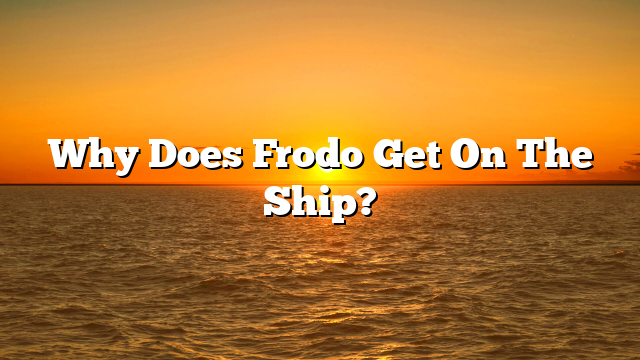In J.R.R. Tolkien’s epic fantasy series, The Lord of the Rings, the character of Frodo Baggins embarks on a perilous and transformative journey that captivates readers with its depth and complexity. As the story nears its conclusion, Frodo finds himself faced with a crucial decision: whether to board a ship that will take him away from Middle-earth. This pivotal moment raises a multitude of questions, leaving readers pondering the motivations behind Frodo’s choice. Why does Frodo decide to leave his beloved homeland and venture into the unknown? What drives him to make this difficult and ultimately life-altering decision? In this article, we will delve into the various factors that influence Frodo’s actions, exploring the emotional and psychological aspects that shape his character and contribute to this significant turning point in the narrative.
To understand Frodo’s decision to board the ship, it is essential to examine the arduous journey he has undertaken throughout the series. Frodo, burdened with the weight of the One Ring, has faced unimaginable dangers and endured harrowing trials alongside his loyal companions. From the treacherous paths of the Misty Mountains to the fiery depths of Mount Doom, Frodo’s resilience and determination have been pushed to their limits. Yet, as the final battle for Middle-earth concludes, Frodo is left scarred, physically and emotionally, by the terrible burden he carried. The lure of the ship represents an opportunity for Frodo to find solace and healing, a chance to escape the pain and darkness that has consumed his life. But is that the sole reason for his departure? Let us unravel the intricacies and motivations behind Frodo’s decision, and discover the profound significance it holds for both the character and the broader themes of the story.
Frodo gets on the ship to leave Middle-earth and journey to the Undying Lands. After the destruction of the One Ring, Frodo is left with emotional and physical scars. His journey has taken a toll on him, and he is ready for a peaceful and healing retreat. The Undying Lands offer a place of rest and rejuvenation for those who have borne the burden of the Ring.

Why does Frodo get on the ship?
Frodo’s decision to get on the ship in the end can be attributed to several key factors. This article will explore the reasons behind Frodo’s choice and shed light on the significance of his decision within the context of the story.
1. Completion of his quest
After enduring numerous trials and tribulations throughout his journey to destroy the One Ring, Frodo reaches the realization that his task is complete. The burden of carrying the Ring has taken a toll on him physically and mentally, and Frodo understands that he can no longer bear its weight. By boarding the ship, he signifies the end of his quest and the fulfillment of his duty to protect Middle-earth from the influence of the Ring.
Furthermore, Frodo recognizes that the Ring’s power is too great for anyone to possess, including himself. The ship represents a means to separate himself from the temptation and danger of the Ring, ensuring its ultimate destruction and preventing its return to the hands of evil forces.
2. Seeking healing and peace
Beyond fulfilling his mission, Frodo’s decision to embark on the ship is driven by a personal need for healing and peace. The burden of the Ring has left him scarred, both physically and emotionally. The wounds of his journey, particularly the influence of the Ring, have taken a toll on Frodo’s well-being.
By joining the ship, Frodo seeks solace in the Undying Lands, a place known for its healing properties. The Undying Lands offer a chance for Frodo to find respite from the trauma he has experienced and to regain his inner peace. It is a way for him to leave behind the conflicts and darkness of Middle-earth, allowing him to start anew and find the healing he desperately needs.
3. Symbolic departure from Middle-earth
In addition to the personal reasons, Frodo’s decision to get on the ship holds significant symbolic meaning. It represents a farewell to Middle-earth, a world that has been forever changed by the events surrounding the One Ring. Frodo’s departure signifies the end of an era and the passing of the responsibility to future generations.
His departure also symbolizes the cyclical nature of Middle-earth’s history. Just as the Ring was destroyed and evil was defeated, Frodo’s departure foreshadows the beginning of a new era of peace and prosperity. By leaving, he paves the way for the healing and rebuilding of Middle-earth, ensuring a brighter future for its inhabitants.
4. The call of the Elves
Lastly, Frodo’s decision to board the ship is influenced by the call of the Elves. The Elves, being immortal beings, have a deep connection to the Undying Lands and are drawn to its shores. Frodo, having formed strong bonds with the Elves during his journey, feels the call as well.
By joining the Elves on their journey to the Undying Lands, Frodo embraces their wisdom and guidance. He seeks to learn from their ancient knowledge and find solace among their kind. The Elves’ presence on the ship also provides Frodo with a sense of comfort and companionship during his transition to the Undying Lands.
Frequently Asked Questions
Here are some common questions about why Frodo gets on the ship:
1. Why does Frodo decide to leave Middle-earth?
Frodo decides to leave Middle-earth because he has been deeply affected by his experiences in the War of the Ring. The burden of carrying the One Ring and the trauma of his journey to Mount Doom have taken a toll on him. He feels a sense of emptiness and longing for healing that he believes can only be found in the Undying Lands.
In the Undying Lands, Frodo hopes to find peace and rest from the physical and emotional wounds he has suffered. It is a place where the Elves dwell and where the Valar, the powerful beings who shape the world, reside. Frodo believes that by leaving Middle-earth, he can find solace and healing in this blessed land.
2. What is the significance of Frodo going on the ship?
Frodo going on the ship holds great significance in the context of J.R.R. Tolkien’s mythology. It represents the passing of the age of the Elves and the diminishing of the power of the Rings of Power. By leaving Middle-earth, Frodo symbolizes the end of an era and the beginning of a new one.
Furthermore, Frodo’s departure on the ship signifies his personal journey towards healing and redemption. It is a culmination of his sacrifice and the ultimate letting go of the burden of the One Ring. By choosing to go on the ship, Frodo embraces his role as a Ring-bearer and accepts the consequences of his actions, while also seeking his own salvation.
3. Does Frodo go on the ship alone?
No, Frodo does not go on the ship alone. He is accompanied by his dear friend Samwise Gamgee, who has been by his side throughout the entire quest. Sam’s loyalty and friendship are rewarded, and he is granted the opportunity to accompany Frodo to the Undying Lands.
The inclusion of Sam in Frodo’s journey on the ship emphasizes the importance of their bond and the shared experiences they have endured. It also highlights the theme of friendship and the power of companionship in Tolkien’s works.
4. Can anyone go on the ship to the Undying Lands?
No, not everyone can go on the ship to the Undying Lands. The Undying Lands are reserved for specific individuals who have earned the privilege or have been granted permission to enter. The Elves, who have ties to the Undying Lands, are able to sail there naturally. However, for mortal beings like Frodo and Sam, special arrangements must be made.
In Frodo’s case, he is allowed to go on the ship due to his role as a Ring-bearer and his sacrifice in destroying the One Ring. The Valar, recognizing his suffering and the weight he carried, grant him the opportunity to find healing and peace in the Undying Lands. It is a unique privilege bestowed upon him as a reward for his actions.
5. What happens to Frodo and Sam after they get on the ship?
After Frodo and Sam get on the ship, they sail westward towards the Undying Lands. The specifics of what happens to them after they reach their destination are not explicitly described in J.R.R. Tolkien’s writings. However, it is believed that they find the peace and healing they sought.
The Undying Lands are a place of rest and rejuvenation, and it is likely that Frodo and Sam are able to leave behind their painful memories and find solace in the blissful realm. Their journey on the ship signifies a new chapter in their lives, free from the burdens of their past and full of hope for the future.
In conclusion, Frodo’s decision to get on the ship in “The Lord of the Rings” symbolizes his ultimate triumph and redemption. Throughout the epic journey, Frodo bears the burden of the One Ring, facing countless dangers and temptations that threaten to corrupt him. However, his unwavering determination, courage, and selflessness enable him to withstand these trials and ultimately destroy the Ring, saving Middle-earth from the clutches of evil.
Getting on the ship signifies Frodo’s final act of letting go, as he leaves behind the traumas and burdens of his quest. The ship represents a passage to a place of healing and peace, where Frodo can find solace and rest from his struggles. It also serves as a metaphor for death and the afterlife, suggesting that Frodo’s sacrifice and heroism have earned him a place in the immortal realms. By choosing to embark on this final journey, Frodo demonstrates his selflessness and willingness to let others carry on the fight, ensuring the preservation of hope and the triumph of good over evil.

















